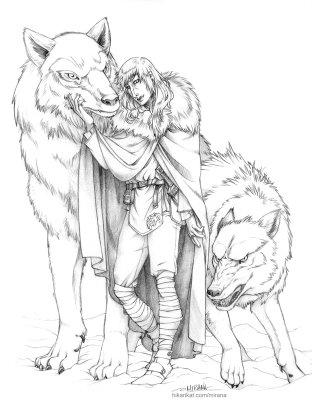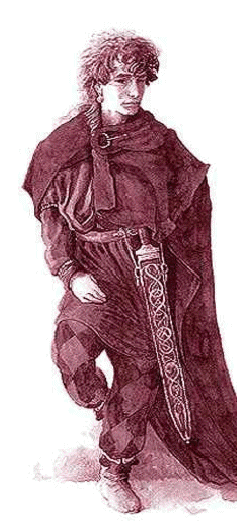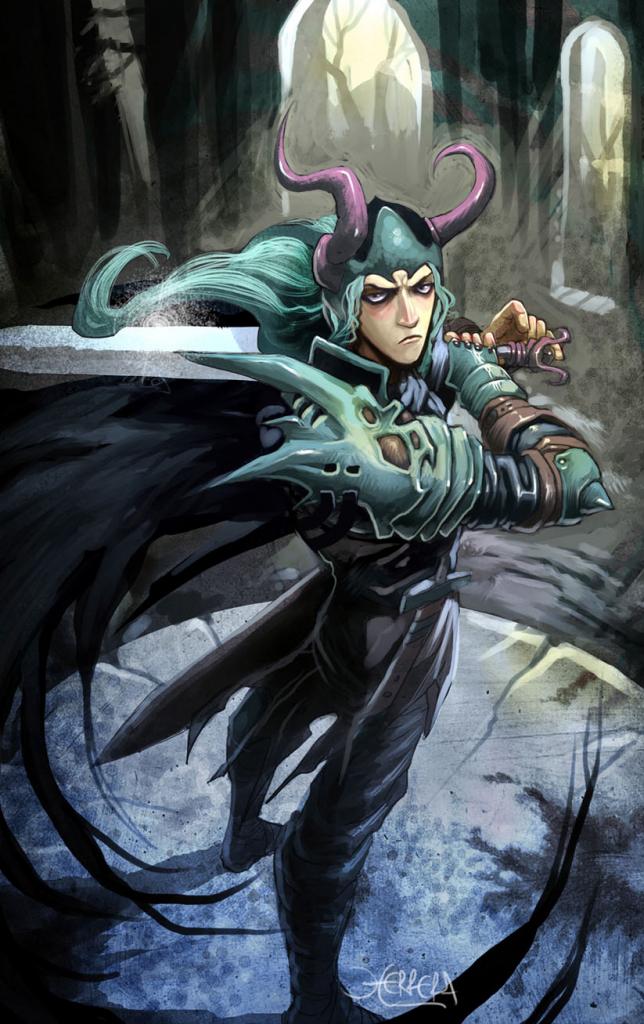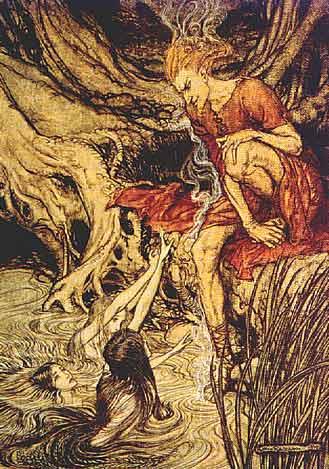


Loki is one of the great Trickster deities of the world’s ancient pantheons. His power over magick and his extreme cunning are legendary, as is his sometimes fickle unpredictability, a trait shared by all divine Tricksters. He is known and sometimes rightfully feared as the god of mischief for this reason. Though he is eminently useful in the scheme of things due to his insuring the necessary level of instability in everyone’s sphere of existence, he can cause disasters of various sorts. The myths are filled with Loki getting his fellow deities into trouble with his antics, but then subsequently doing an equally good job of getting them out of it again. It was therefore clear that Loki was a god of many faces and disparate possibilities, something his shape-shifting ability - into other individuals and animals of either gender – often made quite clear to those who worshipped and revered him.
Most interesting about Loki is that he is a member of neither of the two tribes of deities – the Aesir and the Vanir – who put aside their previous differences to merge into the pantheon of gods known as the Asgardians. Instead, Loki was a comparatively diminutive member of the giants, a third race of humanoid inhabitants of the Nine Worlds known for great power over magick, only they never made peace with either the Aesir or the Vanir. However, the fact that no less than the king of the gods himself, the All-Father Odin, made Loki into his “blood brother” (under circumstances never fully revealed in any of the surviving myths) was testament to the level of importance that the Trickster god played in the affairs of the deities, and likely the entirety of the cosmos. There appears to be a necessary role that the type of being whom Loki represents - the Trickster, one of the great Jungian archetypes that inhabit our collective consciousness - to the human race and our spiritual/metaphysical state of affairs.
Many consider Loki in alignment with various universal forces of chaos due to his impulsive, capricious, and sometimes even diabolical ways; in fact, Christian scholars of Nordic descent who re-wrote the myths of their ancestral culture following the fall of polytheism in Europe indeed interpreted him as a sometimes Satan-like figure. However, many who continue to follow this often misunderstood deity believe such a comparison is unjust, for despite the havoc that Loki can wreak on one’s life - and the degree of caution one must obviously take when invoking him for any purpose - he is not truly ‘evil’ in the absolute, dualistic sense that Christianity interprets the concept, as the myths often attest his usefulness to the deities and the mortal race on many occasions.
Still, there are many things that Loki has done which put the fear of Niflheim into the world of the deities, of course, and this list includes three of the progeny that he brought into the world as a result of his sexual dalliances with the female giant Angrboda (who could apparently shape shift just as Loki could, thus accounting for two of her three offspring with the god of mischief being born in animal form): the largest and most powerful dragon in all of history, Jormungand the Midgard Serpent; the enormous and uber-deadly lupine being known as the Fenris Wolf; and the fearsome goddess Hela, who was born with one side of her body living and healthy and the other side dead and decayed, who became the ruler of the Nordic underworld for this reason. Each of these three offspring of Loki went on to have a major role to play in the oft-prophesied eventual downfall and destruction of the deities along with all of the Nine Worlds, i.e., the cataclysmic event known as Ragnarok.
Additionally, the often jealous deity tricked the blind god Hodur into killing the beloved god of light, Balder, by striking him with an arrow composed of mistletoe wood, the only substance in any of the Nine Worlds that could harm this deity after the protection spells his mother Frigga, the queen of the gods, cast upon him. This event was also prophesied to be one of the main triggers that would ultimately lead into Ragnarok. It can thus be seen that beings such as Loki can be viewed as having an important if discomfiting role in initiating change, which the Norse (in common with the modern Wiccans) believe occurs in cyclical fashion. When this treachery of his was discovered, Loki was said to be punished by being eternally bound to three huge stones inside a cave while a an extremely venomous serpent was situated above his head (courtesy of the goddess Skadi), where it dripped a constant stream of its acidic poison down upon him from above. His loyal wife, the goddess Sigyn, did her best to stand at his side and catch the seething fluid in a large bowl, but during the moments she took to turn and dump the liquid onto the ground once the bowl was full, Loki would scream and writhe in agony as the flowing stream of poison stream hit and seared his skin. In addition, the other deities were said to have transformed his son Narfi into a wolf, who then proceeded to turn upon Loki's other son, Vali, and rip him to shreds. This torturous punishment enraged him to the point that upon his eventual escape, he completely turned upon his fellow deities and led the forces of the giants (his actual people) against them at the onset of Ragnarok. According to legend, during this epic battle Loki was destined to die in personal combat with his arch-enemy, the god Heimdall, guardian of the Rainbow Bridge connecting Asgard to Midgard.
In more recent centuries, Loki has been given an additional attribute by various scholars: rule over the element of fire. His mercurial nature would seem to make his connection with this powerful facet of nature and the type of "cleansing" destruction it can wreak upon any environment, in both a physical and metaphysical sense (depending upon the context of the matter), to be a natural fit.
Loki’s ability to shape shift so as to disguise himself as any humanoid or any type of animal of either gender or any age enables him to move about anywhere undetected, and to create mischief and havoc at his leisure. Hence, many fear this deity, but all must remember his important place in the universe, as well as the scheme of our lives. We may often experience sorrow when he makes his presence known to us, but without him and the forces he represents, true growth and change could never occur, and without them, all aspects of human and universal evolution would not be possible.


